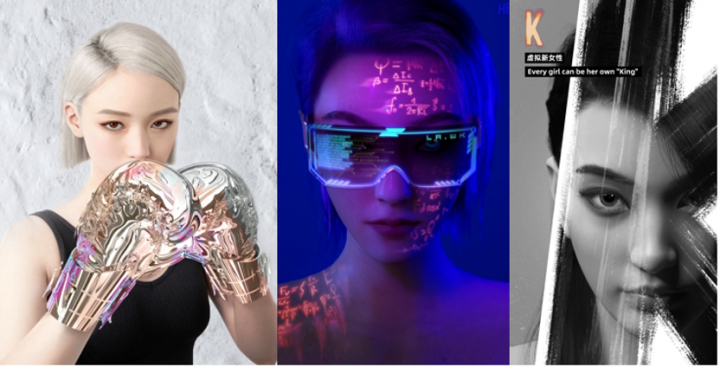

As the metaverse gains international attention, virtual influencers, often seen as gateways to this virtual realm, are taking the digital world by storm. Hyper-realistic virtual influencers like ‘Liu Yexi’ and ‘AYAYI’ have rapidly risen to fame on various social media platforms. ‘Liu Yexi’ amassed a staggering 1.5 million fans on Douyin in just 48 hours, while ‘AYAYI’ garnered over 100,000 likes with her very first post on RED. Virtual influencers are born with a specific goal – to maximize their commercial value. Crafting their personas is as intricate as building a brand, encompassing everything from their name to persona, and a well-thought-out verbal branding strategy plays a significant role.
The strategic naming of virtual humans is a critical aspect of their brand development, as it carries cultural significance and shapes their distinct personas. These unique names not only enhance brand recognition but also lay the foundation for effective branding strategy.
Virtual humans with ethnic style in appearance tend to use names deeply rooted in the local language and culture. For example,「Shudu」and「Hauli」, two African American virtual models favored by luxury brands, get their names from the African language. 「Shudu」signifies success in Ndebele, while「Hauli」represents strength in Kiswahili. 「Imma」is a chic virtual model from Japan with pink bobo hair and Harajuku style. Her name is the romaji of いま in Japanese, meaning “at this moment”.
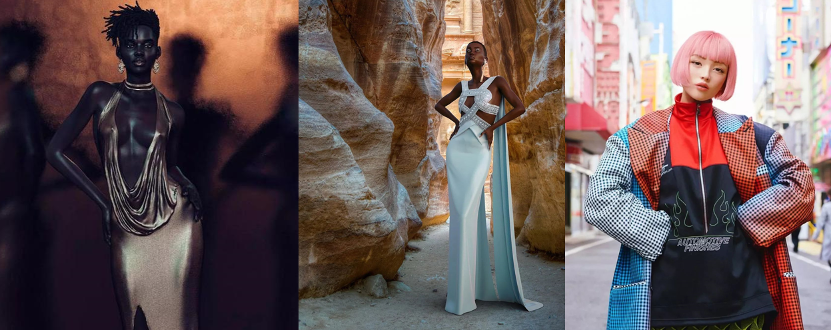
Zoom in on the Chinese market, both names of the popular virtual humans「Ling」and「Liu Yexi」are ingrained in the Chinese culture. 「Ling」not only fancies Chinese fashion & makeup, but also promotes Chinese identity in the climate of growing nationalism. Her name is derived from the flower flag worn in the Peking Opera performance. 「Liu Yexi」was born with a strong Chinese ancient fantasy background. She identifies herself as a demon hunter as well as a virtual beauty vlogger. Her name evokes strong association with traditional Chinese culture.
As digital natives, virtual humans bridge people to the metaverse in Web 3.0 and open up their minds toward a limitless future. Accordingly, there emerged names with inclusiveness and futuristic styles. The most representative example is「AYAYI」, one of the top virtual influencers in China. Her name is inspired by baby babbling “Aya-ee-ya” which symbolizes the “pure nature” in its initial identity as “Human”. Hence, it lays a good foundation for its simulation of real human growth.
Social campaigns led by「AYAYI」 also underline her limitless imagination for the digitalized future. For instance, one of the social tags called #Digital Magic# shows her determination in embracing the virtual fashion elements and the real-world experience. The social contents also convey the concept of warmth and humanities in technology by sharing a series of interviews named “Offline Access”. The posts recorded her authentic experience of visiting disappearing industries and sites caused by the digital gap, for example, the last newsstand in Shanghai. All contents posted by「AYAYI」pictures a better world with the smooth integration of digitalization and reality. In terms of co-branding,「AYAYI」partnered with MAC, and jointly design the “Lightful Look in Metaverse” to emphasize her super-realistic image. With L’Oréal, their joint creation “Mars Compass Digital Ring” also reinforces her futuristic image.
「Li Weike」is another virtual fashion influencer with a stylish look, launched by Hangzhou Li Wei Ke Technology. Her given name “Weike”, phonetically resembles “wake” in English, echoing her persona of a self-awakened risk-taker. Meanwhile, to build up her vivid attributes of self-reliance, the operational teams have released anime titled WAKE未可 on Bilibili *. By revealing her frictionless journey across the digital fantasy and reality, Li Weike’s image of “a self-aware and fearless AI” has been reinforced. Similar to「Li Weike」,「K」, a virtual influencer owned by Bluefocus*, also has a special story behind her name. The name essentially stands for the phrase—”every girl can be her own King”, advocating that women can take control of their own lives. In this case, the “King” becomes a symbol of power. It is shortened to “K” to make the name more gender-inclusive.
In a nutshell, virtual humans’ names are not arbitrarily generated but skillfully created based on the creators’ vision and with the embodiment of self-awareness.
*Bilibili: a popular youth-oriented video-sharing platform
*Bluefocus: a marketing technology company
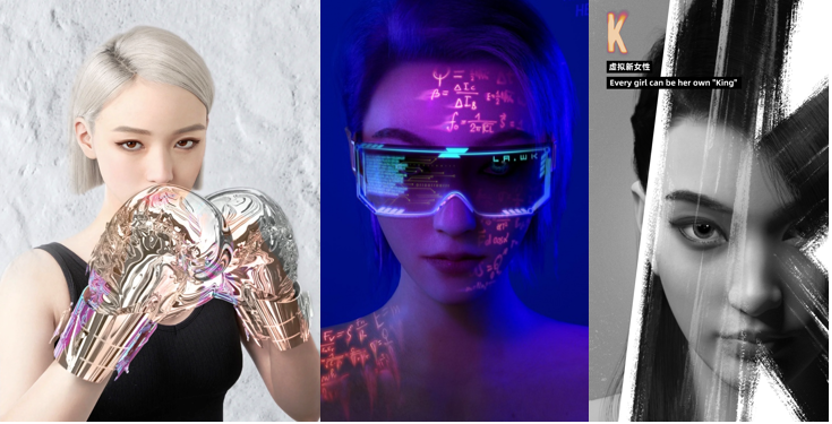
Brands from all industries have formulated adaptable strategies for the metaverse. Creating brand-owned virtual influencers is the first move, since the digitalized humans offer feasible ways to present brands’ personalities and communicate to target audiences. In contrast to previously discussed names with connotations, the names of the brand-owned virtual influencers are more down-to-earth in terms of image and tonality. From cosmetics to fast-food, brands are inclined to name their characters accessibly. For instance, L’Oréal’s「Ou Sir」&「Sister M」, Winona’s「Bro Nuo」&「Weiwei」, Carslan’s「Big Eyes Kaka」, to McDonald’s「Sister Happy」. These names adopt a straightforward expression to shape a more approachable personality and image aiming to bring customers closer.
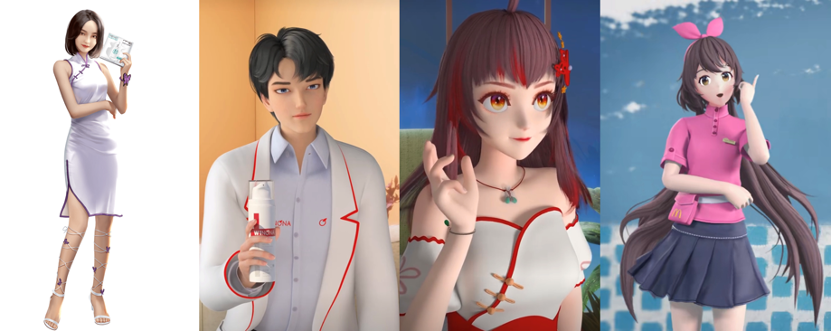
A unique name of virtual humans can make good first impressions. Following the names, a verbal branding strategy further contributes to creating vivid images. Taking a deep look into the rising trend in influencer marketing, we’ve identified three distinctive types of virtual persona that win over younger audiences.
Among all virtual characters from ACGN (a subculture consisting of anime, comics, games, and novels) and the fashion industry, some virtual influencers have managed to stand out. By combining elements of futuristic technology and classical culture, they successfully reach out to Gen Z, who have a stronger sense of national pride.
Sinology is a great source of verbal elements for creating attractive virtual characters. Liu Yexi’s short series of suspense film named The Labyrinth of Earthly Branches on Douyin, have aroused the cultural resonance among Gen Z because of the introduction to “Heavenly Stems and Earthly Branches”. The Chinese astronomical concept is valued as cultural treasure.
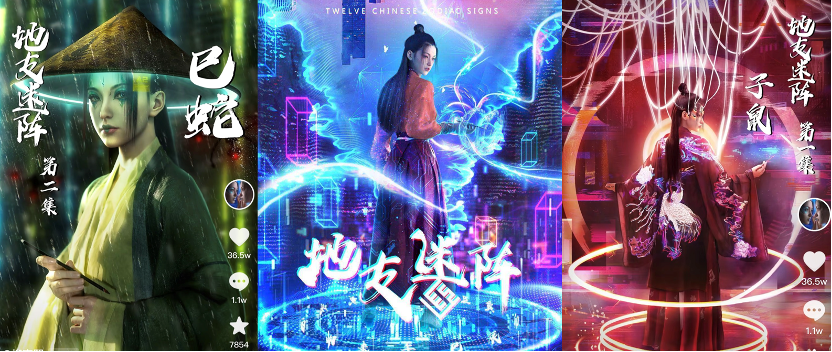
Classical poetry is frequently applied to the marketing of virtual humans. One title of Liu Yexi’s mini-film on Douyin was inspired by Li Bai, one of the greatest Chinese ancient poets. By rewriting his lines, Liu Yexi’s new year themed short film is entitled “Raise your cup and toast to the return of Spring”. This further demonstrates her unique persona rooted in traditional Chinese culture to boost the new year celebration vibe. “Hidden Wonderland”, the title of the first exhibition curated by the meta-human「AYAYI」, is derived from the Chinese idiom “hidden yet wonderful spot”, which embraces Chinese cultural elements while suggesting the fantasy and charm of the virtual world
Virtual humans are regarded as the key to unlock the metaverse. Their highlighted “virtual identity” has become a new social currency on social media. Adding a futuristic touch to expression is the most straightforward way to demonstrate their “virtual identity”. For example, the joint campaign by「AYAYI」and MO Magazine, a virtual magazine, mentioned the “endless imagination about the distant future”. And the collaboration between AYAYI and MAC was about building concepts around “future of light and fantasy”. Such expressions encouraged readers to indulge in the dreamy yet realizable future scenarios.
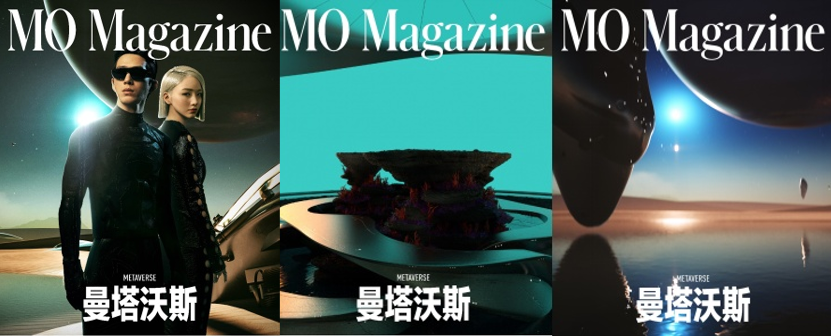
Blurring or even removing the boundary between the virtual world and the reality is another way to emphasize identities of metaverse residents. In fact, “Challenging the Boundary” is the campaign name jointly launched by「AYAYI」and ALIENWARE. It could be interpreted as encouraging consumers to imagine that they can switch freely and seamlessly between the virtual world and the reality. In a RED post,「AYAYI」collaborated with Chi Lvshan to create the virtual work entitled “Virtual Garden in the Backyard-Savage Growth”. The project calls on people to explore more possibilities about virtual human. Instead of just gazing or simply being curious, people are encouraged to think in depth about the boundary between the virtual world & the reality, and differences between human beings & virtual human.
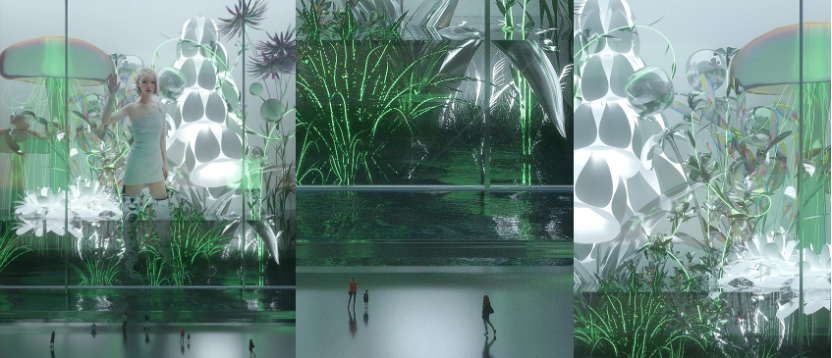
Programming-related expression is used explicitly in the marketing of digitalized personae.「Miquela」launched a fashion brand named Club 404. The number “404” was inspired by “Error 404 not found” which usually appears on a digital screen when users enter an incorrect web address. If interpreted from another perspective, the 404-error code can also stand for a “non-existent web page or space”.「Miquela」 leverages 404 to indicate the “unprecedented fashion” in her brand and highlight her avant-garde and bold designs.

Miquela’s posts on social media platforms constantly convey the message of “being authentic”. It coincides with Gen Z’s value that prioritizes realness. The “GET, REAL 😜” and “my confessionals 🤖 💕” playlists set up on her YouTube channel unveil her “real” life as a virtual character. “REAL” addresses the lack of “authenticity” between virtual characters and human beings, while “confessionals“ emphasizes the sincerity of sharing which also makes her vlogs more realistic and emotive. By sharing joy of self-exploration, ambition in music and struggle over verbal abuse owning to her virtual identity,「Miquela」applies these human-like emotional flaws to quickly bring her closer to the target audiences. At the same time, she frequently uses slangs (such as Lit), abbreviations (such as RN short for “right now” and LOL short for “laugh out loud”) and emojis in daily posts. These common expressions, preferred by Gen Z, give a sense of closeness and relatability, which is conducive to building trust between her and the Gen Z audience.

The emergence of virtual humans is intrinsically tied to their commercial relevance. This connection is especially apparent in the realm of virtual influencers, where a well-executed verbal branding strategy isn’t just a superficial enhancement but a substantial driver of their rapid success and enduring popularity.
The genesis and evolution of virtual humans draw striking parallels to traditional brand development. From the art of bestowing names upon these digital entities to sculpting their unique personae, every facet is meticulously designed to forge a compelling and distinctive image. This evolving image serves as the linchpin for amplified commercial value and prolonged triumph in the virtual landscape.
A Labbrand Group Company © 2005-2024 Labbrand All rights reserved
沪ICP备17001253号-3* Will be used in accordance with our Privacy Policy
To improve your experience, we use cookies to provide social media features, offer you content that targets your particular interests, and analyse the performance of our advertising campaigns. By clicking on “Accept” you consent to all cookies. You also have the option to click “Reject” to limit the use of certain types of cookies. Please be aware that rejecting cookies may affect your website browsing experience and limit the use of some personalised features.